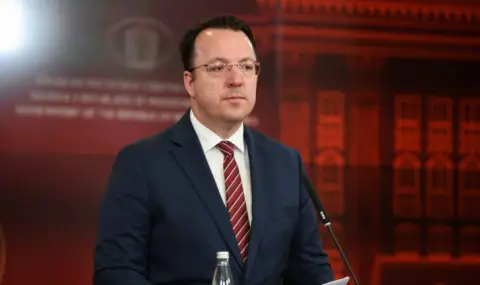If the EU wants North Macedonia to start negotiations, it will start negotiations, because there is no problem with the strongest EU member country - France, but with “the weakest or the second most -weak side of EU” - Bulgaria, said the Deputy Prime Minister and Minister of Transport of North Macedonia, Alexander Nikoloski, quoted by BTA.
In response to a question from how many countries in the EU North Macedonia expects support for the proposal of the government in Skopje that the changes to the constitution enter into force after the country becomes a member of the EU, in an interview with "Sitel" TV. Nikoloski stated that it is more important “not the quantity, but the quality” of the countries to which Prime Minister Hristian Mickoski has presented his proposal.
„And for me, the most significant meeting that Prime Minister Mickoski had was the meeting with the President of France, Emmanuel Macron. Because now France is the number one player in the EU. Macron is undoubtedly the EU leader with the most legitimacy, a clear victory in the presidential election, a government he works with. Germany is entering elections. I was told that (the meeting with Macron) went in an extremely good tone. If we can work well with France and a few other Western European countries, I think our arguments can be easily accepted. If this changes, I am convinced that a serious Western diplomat will solve the problem (with Bulgaria) in one morning or one afternoon in Sofia”, Nikoloski said.
The government of Prime Minister Hristijan Mitskoski does not accept the condition accepted by the EU member states that the second intergovernmental conference for North Macedonia be held "automatically" after the Bulgarians are included in the country's constitution. The proposal that Mickoski presents in his international meetings is that the changes in the constitution enter into force after the end of the negotiations. According to this proposal in Skopje, they believe that they should talk with a political government in Bulgaria.
„At the moment there (in Bulgaria) there is a caretaker government, these are people who are not elected by anyone in elections and can be elected by a limited range of institutions. I once said they were political fringes and they got mad at me, but that's the way it is. Now (in Bulgaria) they had elections and those who are in the caretaker government can form a political party and go out (to elections) to see what the citizens think about them. It's very difficult. On one side (Northern Macedonia), there should be a government with a two-thirds majority in the parliament and with huge electoral legitimacy, and on the other side (Bulgaria) - a government that does not represent anyone. And in such conditions, it is very difficult to conduct any form of dialogue, because the second party cannot make commitments. I hope (in Bulgaria) they still form a government. But from what is seen, there will probably be elections again in March, this is a decision of the citizens of Bulgaria. It is not pleasant to have a neighbor who cannot elect a government for the fourth year, but this is a reality, Nikoloski commented.
